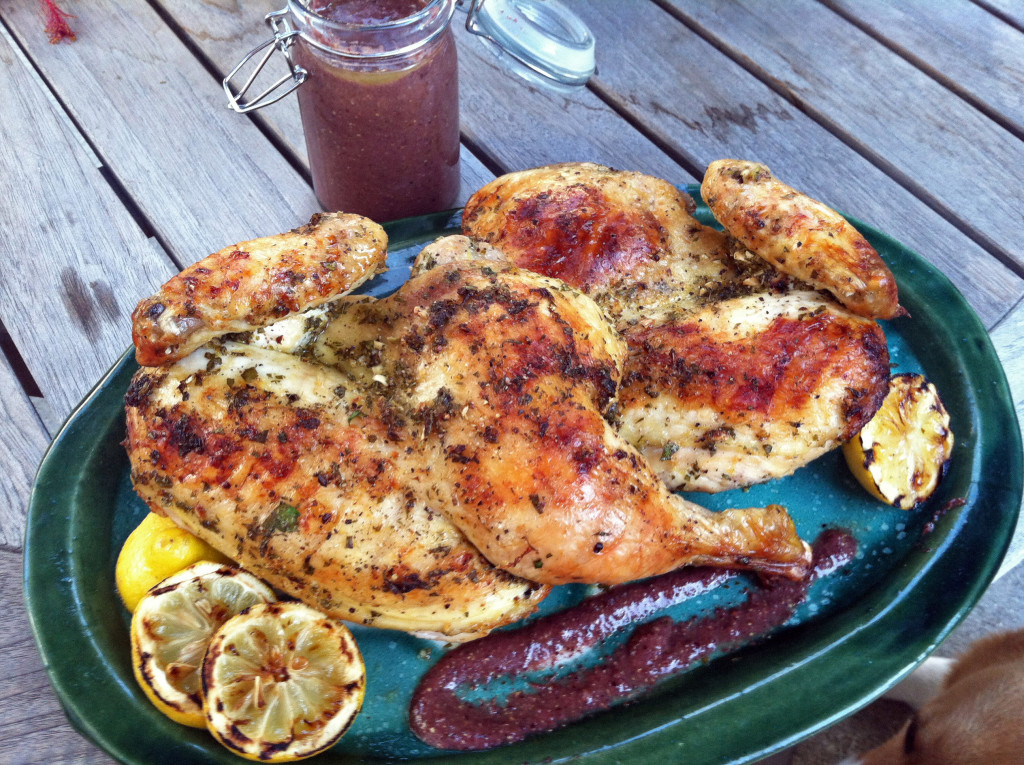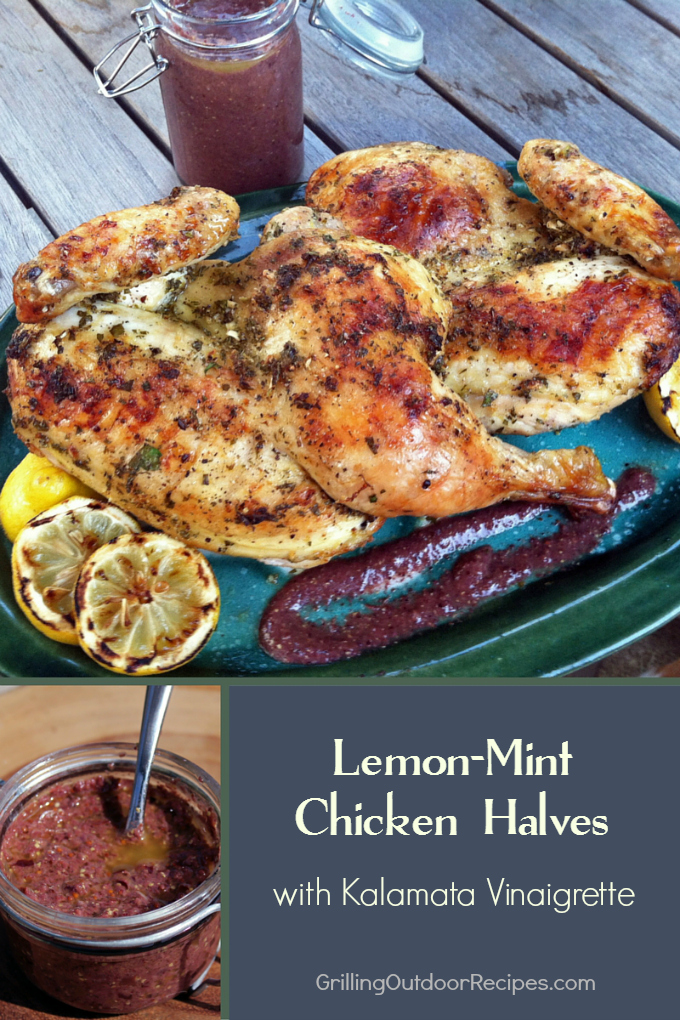I came home from a photo shoot the other day with a beautiful pastured organic chicken. What that means is that the chicken was raised in a pasture as opposed to being confined to a pen. If you ever have the chance to pick one up, I say splurge a little and treat yourself – the flavor and texture is far superior to the run-of-the-mill supermarket broiler.
The photo shoot had been a particularly long one. I was going to be off the next day and had invited a couple friends to stop by for lunch. I wanted to get the chicken in a marinade when I got home that evening, but I didn’t want to have to go to the store. I have said it before, the key to cooking on the fly is having a well stocked pantry. So armed with a few lemons and herbs which I generally have on-hand, I came up with a quick marinade. I didn’t want to worry about carving a whole chicken or, for that matter, moving pieces around the grill, so I cut the chicken in half and removed the backbone. Second to the rotisserie, grill roasting chicken halves is my favorite way to cook chicken. It’s too easy! Plus, the skin gets nice and crisp and the meat is always juicy.
The next day as I was thinking about that little extra something to put it over the top, I spotted a jar of Kalamata olive and remembered a great vinaigrette I had made for a grilling demo a few years ago. I blended up a batch and the briny olive vinaigrette was the perfect counter-point to the lemon marinade. (by the way, this vinaigrette is great on so many things! Try it with my Lemon and Coriander Grilled Asparagus).
Oh, be sure to grill the lemons for squeezing over the chicken when you make this. Grilling them not only gives the flavor a bit of a smoky char, but also caramelizes the sugars to make the lemon juice deeper and sweeter.
- One 4 to 4 ½ pound whole roasting chicken
- 1 cup packed parsley leaves
- ½ cup packed mint leaves, chopped
- 2 anchovies
- 2 cloves garlic, chopped
- ¼ cup fresh lemon juice
- ½ cup extra virgin olive oil
- Kosher salt
- Freshly ground black pepper
- 2 lemons
- Black Olive Vinaigrette, for serving (recipe follows)
- Cut chicken in half with kitchen shears and remove the backbone. Cut away and excess fat and skin. Place chicken halves in a shallow baking dish just large enough to hold them side-by-side; alternatively, use a resealable plastic bag.
- Add parsley, mint, anchovies, garlic, and lemon juice to the bowl of a food processor. Blitz a few times until everything is evenly chopped. With the motor running, pour in the olive oil. Pour the marinade over the chicken halves and turn a few time to coat. Cover and marinate at least 4 hours and as long as overnight, turning occasionally.
- Remove the chicken from the bag and shake off excess marinade and then pat dry with paper towels. Liberally season with salt and black pepper and let sit at room temperature for 30 to 60 minutes to take the chill off.
- Set up grill for indirect cooking over medium-high heat (no direct heat source under chicken); stabilize the temperature around 400° degrees. Place a drip pan below where the chicken will sit. Brush and oil the grates before cooking.
- To ensure a crispy skin, be sure to blot away any moisture from the chicken with paper towels. Sprinkle with salt and pepper and lay the chicken halves skin-side up over the drip pan. Cover the grill and roast for about an hour or until internal temperature reaches 160°F. In the last few minutes of cooking, cut lemons into halves or quarters and rub with a little neutral oil (canola, grape seed, vegetable are all good) and place on the grill over the direct heat. Cook long enough to mark. Transfer chicken to a cutting board and squeeze some charred lemon juice over it. Loosely tent with foil for 10 minutes before carving. Serve hot with Kalamata Vinaigrette on the side.
- ½ pitted Kalamata olives
- 1 clove garlic, chopped
- 1 heaping teaspoon grainy Dijon mustard
- ¼ cup red wine vinegar
- ½ teaspoon kosher or sea salt
- ¼ teaspoon freshly ground black pepper
- ¾ cup extra virgin olive oil
- Add olives, garlic, mustard and vinegar to a blender or food processor; pulse until a paste is formed. With the motor running, slowly pour in the oil until combined. Taste and adjust the seasoning with salt and pepper. Note: add the salt a little at a time to help ease the sharpness of the vinegar.

Cheers and Happy Grilling!
~Jeff






